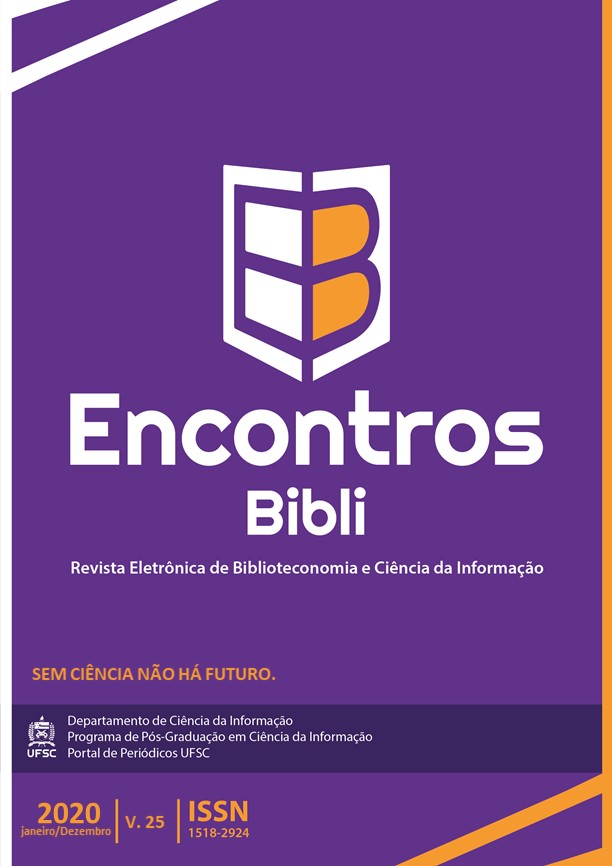Archives
-

Epistemic (in)justices in Library and Information Science
Vol. 28 No. Dossie Especial (2023)Fernando Broncano proposes an approach to epistemology that conceives it as politics within the framework of a radical democratic context, indicating as a starting point that today every exercise linked to the production of knowledge that we see and measure as capital, and while we dispute the concept of knowledge implies to fight for our own lives. Specifically in Librarianship and Information Science, Libraries from Abya-Yala have been an action-research proposal that has sought to forcefully and decisively distance itself from the hegemonic, white, capitalist, and patriarchal places of enunciation, putting in tension the way in which these sciences have been produced, for what and for whom, and above all what kind of knowledge librarianship and information science have the privilege of preserving, disseminating, and prioritizing in the world of life.
With a decade of work, around an anti-colonial and Latin American perspective, it has been visible not only the existence of informational and cultural gaps, but fundamentally epistemic gaps based on processes of epistemic injustices that have kept the production of knowledge around scientific parameters based solely on reason and method. In addition to these, epistemologies of resistance arise, which, as Broncano says, "dedicate themselves to the study of how power and domination can structurally damage the epistemic positions of large groups and social collectives (...) epistemic injustice and the forms of resistance to it, show how the distortion produced by the social position of domination in epistemic positions is a fundamental basis of oppression, exclusion, exploitation and in general of the various forms of injustice” (BRONCANO, 2020, p. 21).
This Dossier aims to present how epistemic injustice in librarianship and information science is a constant in the various scenarios of action of the same, not only of foundation, but also of action. And at the same time, there are currently proposals for reasoning and action, for resistance that seek epistemic justice that privileges the possibility of knowledge as a common good.
In particular, we hope to be able to approach through different themes the types of epistemic injustices proposed by Miranda Fricker and reflected by Beth Patin, Iris Marion Young, David Miller, whose studies foster the development of reflections and counter-narratives that confront understandings of classical epistemology.
Among the existing injustices, we can mention four of them:
- Testimonial injustice occurs when the other is questioned in his/her ability to know. It occurs when prejudice leads a listener to diminish the credibility of a sender, not in a moment of accidental exclusion, but in a structural-systematic way;
- Hermeneutic injustice refers to the interpretive vacuum of subjects that prevents them from interpreting their experiences because they do not have the tools to do so. It corresponds to a previous phase in which the lack of resources for collective interpretation makes it difficult for the subject to understand his own experiences;
- Curricular Injustice, which refers to the absence of physical resources to favor the epistemic development of subjects in a dignified and equitable way;
- Participatory Injustice, which occurs when subjects are excluded from the participatory processes of construction of their epistemological development.
The topics developed in the Dossier are:
- Epistemologies of resistance for/in library and information science;
- Knowledge and democracy for/in library and information science;
- Epistemic damages and (in)justices in library and information science;
- Knowledge situated in library and information science;
- Southern Epistemologies in library and information science;
- Populations historically subordinated in/by library and information science;
- Social justice and its spheres: racial justice, gender justice, ecological justice and information justice;
- Macro and micro aggressions against marginalized people in Libraries and Information Units;
- Tactics of re-existence and redefinition of marginalized peoples.
REFERENCES
BRONCANO, F. Conocimiento expropiado: epistemología política en una democracia radical. España: Akal, 2020.
CASTRO-GÓMEZ, S.; GUARDIOLA-RIVERA, Ó. El Plan Colombia, o de cómo una historia local se convierte en diseño global. Nueva Sociedad, v. 175, p. 111-120, sept./oct. 2001.
FANON, F. Piel negra, máscaras blancas (ed. 55). Madrid: Ediciones Akal, 2o09.
GLISSANT, É. Le discours antillais (1981). Paris: Gallimard, 1997.
MIGNOLO, W. Decires fuera de lugar: Sujetos dicentes, roles sociales y formas de inscripción. Revista de Crítica Literaria Latinoamericana, Año 21, n. 41, p. 9-31, 1995. Disponible en: http://www.jstor.org/stable/4530794.
MIGNOLO, W. Historias locales/diseños globales: colonialidad, conocimientos subalternos y pensamiento fronterizo. Madrid: Akal Ediciones, 2003a.
MIGNOLO, W. Os esplendores e as misérias da ‘ciência’: Colonialidade, geopolítica do conhecimento e pluri-versalidade epistémica. In: SANTOS, B. (Ed.). Conhecimento prudente para uma vida decente: Um discurso sobre as ciências’ revistado. Lisboa: Edições Afrontamento, 2003b. p. 631-671.
PÉREZ MONTERROSO, M. V. Fricker, Miranda (2017). Injusticia epistémica (Ricardo García Pérez, Trad.). Barcelona, CT: Herder. 300 p. Las Torres de Lucca. Revista Internacional de Filosofía Política, v. 8, n. 15, p. 247-250, 2019. https://revistas.ucm.es/index.php/LTDL/article/view/76776
QUIJANO, A. Colonialidad del poder y clasificación social. Journal of world-systems research, v. VI, n. 2, p. 342-386, summer/fall, 2000.
SILVA, F. C. G.; GARCEZ, D. C.; SILVA, R. A. Conhecimento das margens: da injustiça epistêmica à valorização do conhecimento negro em biblioteconomia e ciência da informação. Revista ACB: Biblioteconomia em Santa Catarina, v. 27, n. 1, p. 1-19, 2022. Disponível em: http://hdl.handle.net/20.500.11959/brapci/198025. Acesso em: 29 ago. 2022.
VERONELLI, G. A. La colonialidad del lenguaje y el monolenguajear como práctica lingüística de racialización. Polifonia, v. 26, n. 44, p. 146-159, 2019. -

A Arte da Bibliografia
Vol. 25 No. Especial (2020)Thematic dossier related to the VI International Seminar The Art of Bibliography, held at Florianópolis on December 5th and 6th, 2019, organized in partnership by PPGInfo / UDESC and PGCIN / UFSC. The theme of the seminar was "From material and epistemic conditions to socio-cultural dilemmas".
Art by Rodrigo de Araujo
-

Edição Especial - v. 23, n. esp. 1 (2018)
Número Especial do Congresso de Gestão Estratégica da Informação, Empreendedorismo e Inovação (CGEI) 2017.







































